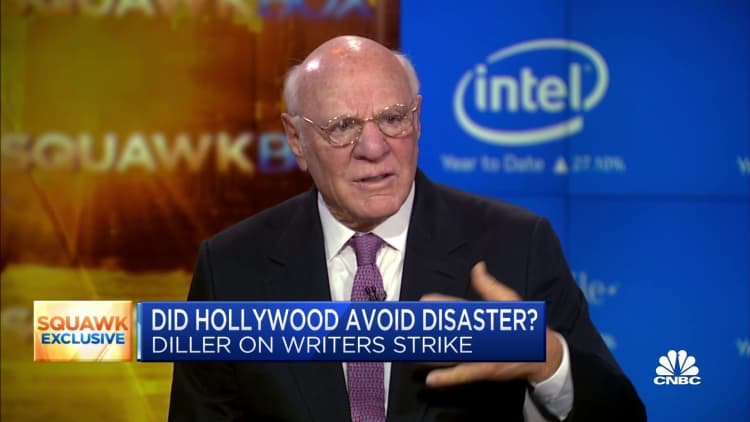
Striking WGA (Writers Guild of America) members picket with striking SAG-AFTRA members outside Paramount Studios on September 18, 2023 in Los Angeles, California.
Mario Tama | Getty Images
Hollywood writers and studios have finalized the language of a tentative contract that will lead to the end to a nearly 150-day labor strike.
Union leaders “voted unanimously to lift the restraining order and end the strike as of 12: 01 am PT/3: 01 am ET on Wednesday, September 27th,” the WGA said in a statement.
Talks between the Writers Guild of America and the Alliance of Motion Picture and Television Producers, which includes top studios like Disney, Paramount, Universal and Warner Bros. Discovery, resumed after months of starts and stops, ultimately leading to a preliminary deal.
The deal will last until May 2026 and includes a 5% minimum pay increase upon the ratification of the contract. Another 4% bump will occur on May 2, 2024, and another 3.5% increase will be instituted on May 5, 2025.
Writers were able to gain significant protections against the use of artificial intelligence. Namely, AI cannot write or rewrite literary material and AI-generated material will not be considered source material.
When it comes to streaming, the guild negotiated a new residual based on viewership. High budget subscription video on demand series and films that are viewed by 20% or more of the service’s domestic subscribers in the first 90 days of release get a bonus equal to 50% of the fixed domestic and foreign residual. Views are calculated by hours streamed domestically of the season or film divided by the runtime.
This new structure will go into effect on Jan. 1 and means writers would receive a bonus of $9,031 for a half-hour episode, $16,415 for a one-hour episode, or $40,500 for a streaming feature with a budget of over $30 million budget.
Streamers will also provide the guild the total number of hours streamed both domestically and internationally for self-produced high budget streaming programs like Netflix’s original series.
Across the board, scribes will see an increased contribution rate to their health and pensions as well as increased contributions for writing teams.
The agreement also improved screenwriter compensation, writers’ room minimums and renewed a $250,000 showrunner training program, among other items.

The negotiating committee recommended the agreement and sent it to the Writers Guild of America West Board and the Writers Guild of America East Council for approval. Both the board and council voted to authorize a contract ratification vote by membership.
WGA members will have until Oct. 9 to cast their votes on the contract, the union said.
Once negotiations are wrapped up with writers, the AMPTP will need to pivot to negotiations with the Screen Actors Guild-American Federation of Television and Radio Artists. The acting guild’s members have been on strike since mid-July and are seeking contract updates similar to those requested by the writers.
The WGA contract could act as a template for SAG-AFTRA to draft its own deal with Hollywood studios.
Similar to writers, actors are looking to improve wages, working conditions, and health and pension benefits, as well as establish guardrails for the use of AI in future television and film productions. Additionally, the union is seeking more transparency from streaming services about viewership so that residual payments can be made equitable to linear TV.
SAG-AFTRA has also looked to standardize the self-tape process, which became popular during the pandemic. Previously, actors would have an even playing field with in-person camera tests, but in recent years, actors have seen inequity in auditioning between those who can afford quality camera and lighting equipment and those who can’t.
Disclosure: Comcast is the parent company of NBCUniversal and CNBC. NBCUniversal is a member of the Alliance of Motion Picture and Television Producers.